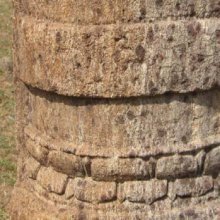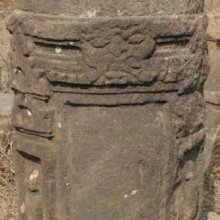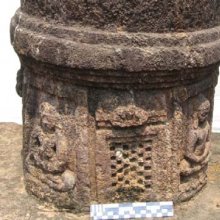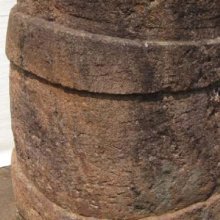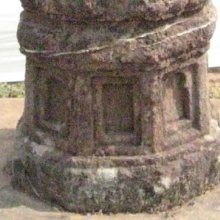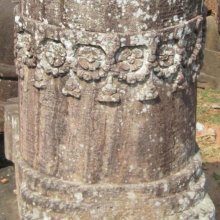Medhi: 15 definitions
Introduction:
Medhi means something in Hinduism, Sanskrit, Buddhism, Pali, the history of ancient India, Marathi, Jainism, Prakrit, biology. If you want to know the exact meaning, history, etymology or English translation of this term then check out the descriptions on this page. Add your comment or reference to a book if you want to contribute to this summary article.
Images (photo gallery)
(+15 more images available)
India history and geography
Source: Cologne Digital Sanskrit Dictionaries: Indian Epigraphical GlossaryMeḍhi.—(LP), a barn-yard, a threshing floor. Note: meḍhi is defined in the “Indian epigraphical glossary” as it can be found on ancient inscriptions commonly written in Sanskrit, Prakrit or Dravidian languages.

The history of India traces the identification of countries, villages, towns and other regions of India, as well as mythology, zoology, royal dynasties, rulers, tribes, local festivities and traditions and regional languages. Ancient India enjoyed religious freedom and encourages the path of Dharma, a concept common to Buddhism, Hinduism, and Jainism.
Biology (plants and animals)
Source: Google Books: CRC World Dictionary (Regional names)1) Medi in India is the name of a plant defined with Ficus palmata in various botanical sources. This page contains potential references in Ayurveda, modern medicine, and other folk traditions or local practices It has the synonym Ficus pseudocarica Miq..
2) Medi is also identified with Ficus racemosa It has the synonym Covellia glomerata (Roxburgh) Miquel (etc.).
Example references for further research on medicinal uses or toxicity (see latin names for full list):
· London Journal of Botany (1848)
· Numer. List (4549)
· Species Plantarum, ed. 4
· Biotropica (2006)
· Flora de Filipinas (1837)
· Flora Aegyptiaco-Arabica (1775)
If you are looking for specific details regarding Medi, for example chemical composition, side effects, health benefits, extract dosage, diet and recipes, pregnancy safety, have a look at these references.

This sections includes definitions from the five kingdoms of living things: Animals, Plants, Fungi, Protists and Monera. It will include both the official binomial nomenclature (scientific names usually in Latin) as well as regional spellings and variants.
Languages of India and abroad
Pali-English dictionary
Source: Sutta: The Pali Text Society's Pali-English DictionaryMedhi, (f.) (Vedic methī pillar, post (to bind cattle to); BSk. medhi Divy 244; Prk. meḍhi Pischel Gr. § 221. See for etym. Walde, Lat. Wtb. s. v. meta) pillar, part of a stūpa (not in the Canon?). (Page 541)

Pali is the language of the Tipiṭaka, which is the sacred canon of Theravāda Buddhism and contains much of the Buddha’s speech. Closeley related to Sanskrit, both languages are used interchangeably between religions.
Marathi-English dictionary
Source: DDSA: The Molesworth Marathi and English Dictionarymēḍhī (मेढी).—f (Dim. of mēḍha) A small bifurcated stake: also a small stake, with or without furcation, used as a post to support a cross piece.
Marathi is an Indo-European language having over 70 million native speakers people in (predominantly) Maharashtra India. Marathi, like many other Indo-Aryan languages, evolved from early forms of Prakrit, which itself is a subset of Sanskrit, one of the most ancient languages of the world.
Sanskrit dictionary
Source: DDSA: The practical Sanskrit-English dictionaryMedhi (मेधि).—See मेथि (methi).
Source: Cologne Digital Sanskrit Dictionaries: Edgerton Buddhist Hybrid Sanskrit DictionaryMedhī (मेधी).—according to [Pali Text Society’s Pali-English Dictionary] (s.v. medhi, citing no passage from Pali!) = Sanskrit methi, pillar, as part of a stūpa. But the context suggests rather one of several (here three) concentric galleries running around a stūpa (as at Boro- budur), or the story-structures supporting them: Divyāvadāna 244.9 f. (stūpasya…catvāri sopānāny) ārabdhāni kā- rayitum, yāvad anupūrveṇa prathamā medhī tato 'nupūr- veṇa dvitīyā tatas tṛtīyā medhī yāvad anupūrveṇāṇḍam (see aṇḍa). This is confirmed by Tibetan ḥkhor sa = medhī, Bailey, JRAS 1950.180; read medhyāṃ for yaṣṭyāṃ Divyāvadāna 47.23.
Source: Cologne Digital Sanskrit Dictionaries: Shabda-Sagara Sanskrit-English DictionaryMedhi (मेधि).—m.
(-dhiḥ) A post fixed in the centre of a threshing floor or barn to which the cattle are attached, as they turn round it to tread out the corn. E. medha to associate or connect, (the oxen, &c.) in aff.
Source: Cologne Digital Sanskrit Dictionaries: Benfey Sanskrit-English DictionaryMedhi (मेधि).—see methi.
Source: Cologne Digital Sanskrit Dictionaries: Cappeller Sanskrit-English DictionaryMeḍhī (मेढी).—[feminine] = methi, methī.
--- OR ---
Medhi (मेधि).—= methi & methī.
--- OR ---
Medhī (मेधी).—= methi & methī.
Source: Cologne Digital Sanskrit Dictionaries: Monier-Williams Sanskrit-English Dictionary1) Meḍhī (मेढी):—f. = methi, methī q.v.
2) Medhi (मेधि):—See methi.
3) See methi
4) Medhī (मेधी):—[from medhi] f. (cf. methī) a [particular] part of a Stūpa, [Divyāvadāna]
5) [v.s. ...] See methi
Source: Cologne Digital Sanskrit Dictionaries: Yates Sanskrit-English DictionaryMedhi (मेधि):—(dhiḥ) 2. m. A post to which cattle are tied to tread out the corn.
[Sanskrit to German]
Sanskrit, also spelled संस्कृतम् (saṃskṛtam), is an ancient language of India commonly seen as the grandmother of the Indo-European language family (even English!). Closely allied with Prakrit and Pali, Sanskrit is more exhaustive in both grammar and terms and has the most extensive collection of literature in the world, greatly surpassing its sister-languages Greek and Latin.
Prakrit-English dictionary
Source: DDSA: Paia-sadda-mahannavo; a comprehensive Prakrit Hindi dictionaryMeḍhi (मेढि) in the Prakrit language is related to the Sanskrit word: Methi.
Prakrit is an ancient language closely associated with both Pali and Sanskrit. Jain literature is often composed in this language or sub-dialects, such as the Agamas and their commentaries which are written in Ardhamagadhi and Maharashtri Prakrit. The earliest extant texts can be dated to as early as the 4th century BCE although core portions might be older.
Kannada-English dictionary
Source: Alar: Kannada-English corpusMēḍhi (ಮೇಢಿ):—[noun] = ಮೇಠಿ [methi].
Kannada is a Dravidian language (as opposed to the Indo-European language family) mainly spoken in the southwestern region of India.
See also (Relevant definitions)
Starts with: Medhi-haraka, Medhibhuta, Medhika, Medhila, Medhin, Medhingamata, Medhini, Medhira, Medhishtha, Medhistambha, Medhiyagrama, Medhiyas, Meti-talai-micaininral, Metikkavunan, Metini, Metiyan.
Ends with: Bakulamedhi, Grihamedhin, Pratimedhi, Shankhamedhi.
Full-text (+20): Methi, Medhibhuta, Meti, Medhaki, Balopacara, Medhi-haraka, Medi anwal, Manchi medi, Bakulamedhi, Medhistambha, Nikadha, Jiramanim-padanem, Suvarnaganita, Medi, Samadha, Antarnishtha, Jalima, Trailokyacintamani, Medha, Natha.
Relevant text
Search found 13 books and stories containing Medhi, Mēḍhī, Meḍhī, Meḍhi, Medhī, Mēḍhi, Medi, Mēḍi; (plurals include: Medhis, Mēḍhīs, Meḍhīs, Meḍhis, Medhīs, Mēḍhis, Medis, Mēḍis). You can also click to the full overview containing English textual excerpts. Below are direct links for the most relevant articles:
Stupas in Orissa (Study) (by Meenakshi Chauley)
Minor Structural Stupas at Udayagiri (Western Zone) < [Chapter 4]
Minor Structural Stupas at Ratnagiri < [Chapter 4]
The Medhi Portion (of the Stupa) < [Chapter 4]
Amaravati Art in the Context of Andhra Archaeology (by Sreyashi Ray chowdhuri)
Lower Kṛṣṇā Valley (15): Chandavaram < [Chapter 2 - Amarāvatī and other Archaeological Sites of Ancient Andhra Pradesh]
Lower Kṛṣṇā Valley (3): Jaggayyapeṭa < [Chapter 2 - Amarāvatī and other Archaeological Sites of Ancient Andhra Pradesh]
Religious background of early Andhra Pradesh < [Chapter 3 - Amarāvatī and the Formative Stage of the Buddhist Art]
Satirical works of Kshemendra (study) (by Arpana Devi)
9.7. Summary of the Rahgharā (1916) < [Chapter 1 - Introduction]
Puppetry in Assam (by Gitali Saikia)
Puppetry in Assam (Introduction) < [Chapter 4]
Vernacular architecture of Assam (by Nabajit Deka)
Traditional Dormitories of Assam < [Chapter 8]
Garo Dormitory: Nokpante < [Chapter 8]
Development of Vernacular Architecture in Assam < [Chapter 3]
Vishnudharmottara Purana (Art and Architecture) (by Bhagyashree Sarma)
2. The Viṣṇudharmottara-purāṇa and the Indian Classical Dances < [Chapter 6 - Modern Relevance of Different Art Forms and Architecture]
Related products
